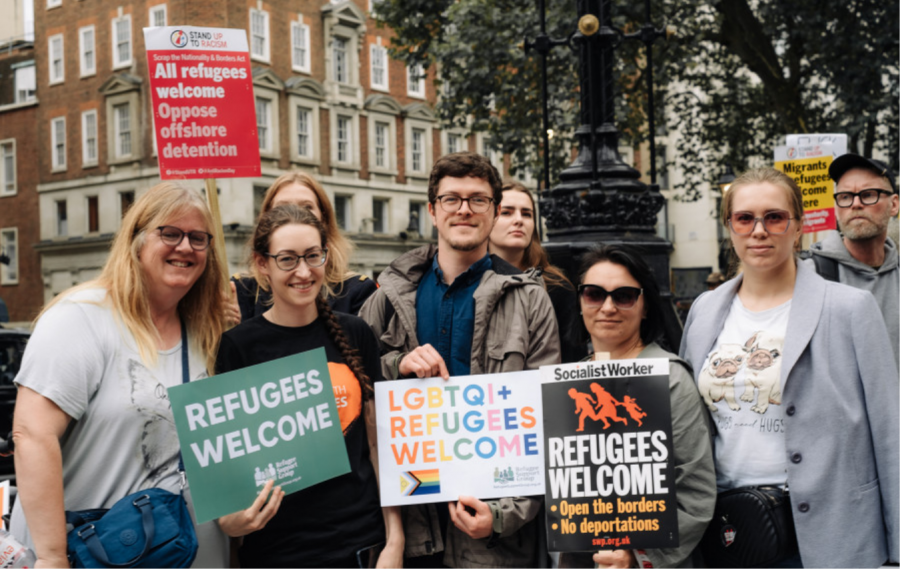Here are the campaigns we are currently supporting.
Please take a look and take action
Fight the Anti-Refugee Laws
The right to seek and claim asylum is enshrined in the 1951 UN Refugee Convention and the 1967 Protocol. In the UK, these fundamental legal principles that underpin the international refugee regime have become endangered. The Nationality and Borders Act, passed in March 2022, undermines both the letter and the spirit of the Refugee Convention: for the first time, people who arrive in the UK via unsafe routes will no longer be entitled to full refugee status.
The United Nations High Commission for Refugees (UNHCR) have said that the Nationality and Borders Act violates the Refugee Convention. Not only does it fail in its aims to ‘reduce dangerous journeys, tackle human trafficking or fix a “broken” asylum system,’ but it criminalises the act of seeking asylum, denies refugees the ‘rights that are guaranteed to them under the Refugee Convention and international law,’ and ‘impermissibly externalise[s] the UK’s obligations to refugees and asylum seekers within its jurisdiction.’
Life for refugees in Britain is becoming increasingly hostile, as successive governments usher in more expansive deterrence policies, generating new challenges for frontline organisations like RSG. We affirm, above all, that refugees should not be returned to their country of origin or any other country to face persecution, danger or abuse, and that refugees should be protected without discrimination of any kind that is based on their characteristics, beliefs or origin.
The Nationality and Borders Act, known by campaigners as the ‘Anti-Refugee Laws’, has created two tiers of asylum seekers: those who enter the UK through limited resettlement routes, and those who take unsafe routes, including crossing the channel by boat. This is known as the ‘differentiated treatment of refugees’.
UNHCR has affirmed that, ‘the attempt to create two different classes of recognised refugees is inconsistent with the Refugee Convention and has no basis in international law.’ In fact, ‘There is nothing in the Refugee Convention that defines a refugee or their entitlements under it according to their route of travel, choice of country of asylum, or the timing of their asylum claim.’
As a member of the 400-strong Together with Refugees coalition, and signatory of the ‘Fight the Anti Refugee Laws’ pledge, we continue to demand a kind, fair and humane asylum system for people fleeing war, violence and persecution.
Stop the Flights!
The passage of the Nationality and Borders Act in April 2022 paved the way for the use of offshore detention. On 13th April 2022, the UK struck a deal with the Rwandan authorities to begin plans for removing people to Rwanda before hearing their asylum claims. UK taxpayers have already handed over £120 million to the Rwandan authorities under the ‘UK-Rwanda Migration and Economic Development Partnership.’
The first flight was set to take off on 14th June, but was cancelled before following an intervention from the European Court of Human Rights. On the 19th of December 2022, the High Court ruled that the UK government’s plan to send asylum seekers to Rwanda is legal. This has since gone to the Court of Appeal. No removal flights to Rwanda will take place while the court case is ongoing.
Lift The Ban
People seeking asylum in our country are banned from working. Unable to provide for themselves and their families, they’re often left to live in poverty. The ban on working reduces morale and resilience amongst our client population, and heightens risks to mental health. It prevents integration into the workforce and community.
People seeking asylum should be given the right to work after six months of having lodged an asylum claim or further submission, unconstrained by the shortage occupation list.There is a rational, moral and financial case for the right to work: the Treasury could make £333 million per year savings by giving asylum claimants the right to work after six months.YouGov polling shows that 81% of the public support giving people seeking asylum the right to work.
There are lots of different ways to get involved with the Lift The Ban campaign. Sign the petition to Lift The Ban here and check out the Activism Pack here to find out more.
Challenging Unsuitable Accommodation
Transition Hotels
Since August 2021, more than 20,000 Afghans who arrived in Britain under the ARAP and ACRS schemes have been living in so-called ‘transition’ hotels. More than half are still living in temporary hotel accommodation, unable to fully settle and begin to rebuild their lives. According to the Home Office, there are currently 25,000 asylum seekers and 12,000 Afghan refugees in transition hotels, a total of 37,000 people.
At the end of 2021, RSG was supporting two transition hotels in Berkshire. These have since condensed into one. We are currently working with over 100 people, a number which remains relatively consistent, as when one family moves out into private accommodation, another quickly moves in.
RSG argues that Afghan the resettlement schemes have been slow and ineffective: only four Afghans have so far been resettled under the second phase of the ACRS scheme.
Some of those evacuated last year left behind spouses and young children. There is no route for them to be reunited with their family members still stuck in Afghanistan. We continue to call on the government to create a route to resettlement for direct family members of those who have been resettled from Afghanistan. Otherwise, the number of Afghans crossing the Channel will continue to increase.
A solution must be found to this accommodation crisis for Afghan families.
Dispersal and Contingency Hotels
While a person’s asylum claim is being processed, they often live in hotels rather than in accommodation in the community, as was once the case. Despite the government’s promise to end the use of hotels, the Refugee Council found (here) that ‘the hotel population of people seeking asylum almost tripled over the course of 2021, with a staggering 26,380 people being accommodated in hotels across the UK at the end of 2021.’
The Refugee Council have reported on the impact of prolonged hotel stays on child development, and the damage caused to people’s health and wellbeing, including depression and suicidal ideation. There has also been a rise in deaths in asylum accommodation over the last two years, as well as reports that children are knowingly being placed in hotel accommodation with adults.
It currently costs taxpayers around £5 million a day to accommodate over 37,000 asylum claimants and Afghan refugees in hotels. As a result, the government has also announced they will be using repurposed military facilities the accommodate asylum claimants as a cheaper alternative to hotel accommodation. Despite the concerns raised about the use of Napier Barracks as an accommodation facility, six further ex-military bases have been earmarked to accommodate 30,000 asylum claimants. These will be semi-closed facilities, with residents expected to be onsite overnight. They will feature daily ID check, external and internal CCTV, a controlled access point and security perimeter patrols.
We are hugely concerned by reports of children going missing at hotel accommodation for unaccompanied children. Around 100 asylum-seeking children have gone missing from a single Sussex hotel. The Home Office has ignored repeated warnings that these hotels are unsafe for children, with the government now confirming 440 occurrences of children going missing from hotels since July 2021. Shockingly, 200 children remain missing.RSG has signed this joint letter here organised by the Refugee Council and we encourage you to contact your MP at the link here.
Immigration detention centres exist all over the UK. Many individuals are locked up in prison-like conditions with no recourse to legal oversight and no indication of how long they will be locked up. The UK remains the only country in Europe without a time limit on detention. Detention is intended as a resource for those awaiting deportation, but its use in the UK includes detention of people later released back into the community.
A 28-day time limit on detention must be imposed and enforced across the UK, in line with other European countries.
We reject the use of detention for those seeking asylum and support the use of alternative community-based models. Read more about those here.
RSG is an active member of the Coalition to Keep Campsfield Closed. Sign the petition to oppose the reopening of a detention centre in Oxfordshire here.
Resisting the Hostile Environment
The UK Home Office introduced its Hostile Environment policy in the 2014 Immigration Act. The policy’s stated aim is to create such difficulties for individuals without leave to remain in simply living their everyday lives and accessing social services that they ‘voluntarily’ choose to leave.
The immigration controls that make up the Hostile Environment are designed to prevent individuals without leave to remain from accessing healthcare, housing, education, work, and benefits by requiring the NHS, landlords, charities, and banks to check a person’s immigration status before offering them a job, housing, or support.
The hostile environment aims to criminalise the everyday activities of undocumented migrants, including working, driving, or renting, and disincentivise people from accessing these services for fear of being identified as ‘irregular’, detained, and deported. Read more here.
Another way that our clients face hostility in the UK is through the dehumanising and demonising narratives and stereotypes about refugees often perpetuated by the mainstream press, and sometimes politicians.
In recognition that the language we use to describe refugees is directly related to perceptions of, and thus experiences of, refugees in the UK, RSG have signed Migrants’ Rights Network’s ‘Words Matter’ pledge, to challenge harmful and divisive language where and when we see it. We have pledged to call out the use of words that alienate and demean migrants and refugees, and to stand up and challenge language which encourages division and harms refugees.
Feeling inspired to campaign with us?
Sign up to be a Campaigns Volunteer and help us campaign to improve the lives of refugees in Berkshire.

